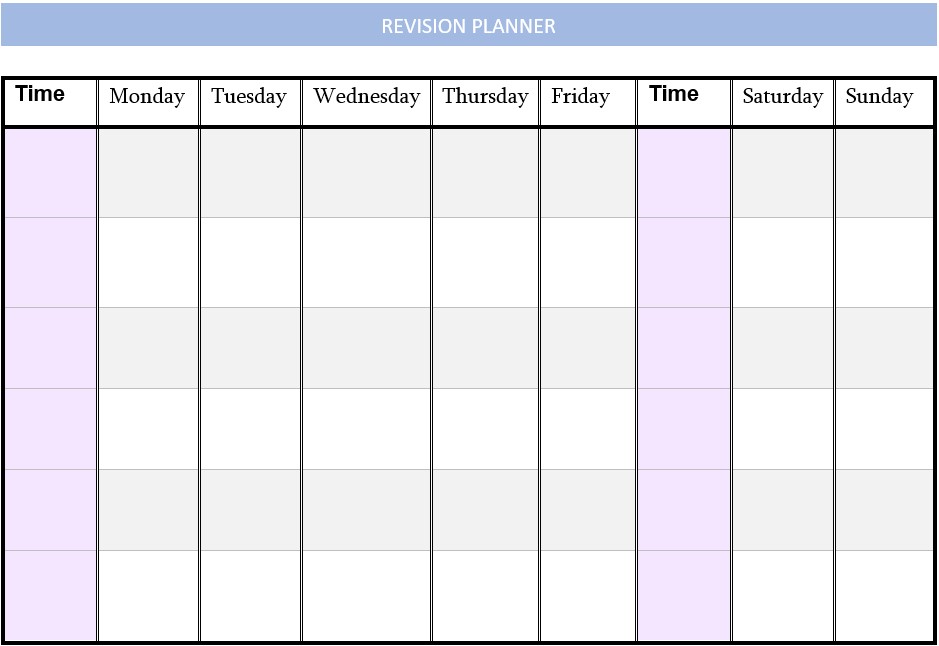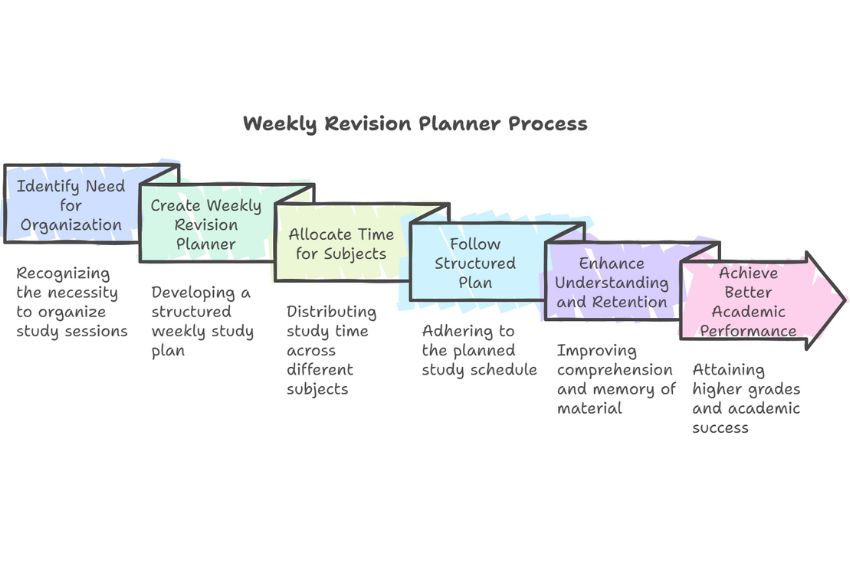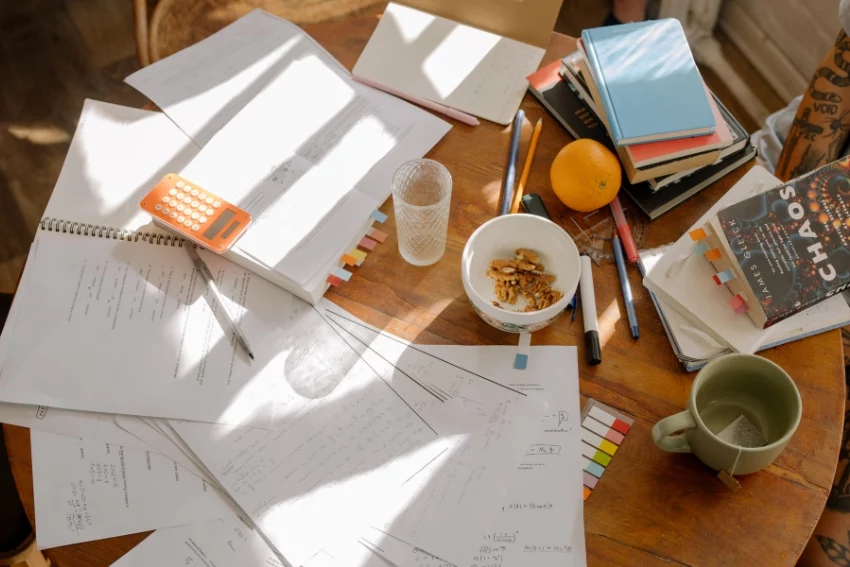GCSE Revision Plan: What You Need To Know About Perfect Routine
Table of Contents:
- Introduction
- Why Should You Start Your GCSE Revision Early?
- What Is GCSE Revision Planner and How To Use It?
- How to Set Realistic Goals
- Focusing on Your Weaknesses
- Making the Most of Your Time
- Use Past Papers to Your Advantage
- How To Plan GCSE Revision: Example of a Typical Day for a GCSE Student
- How to Manage Stress During Revision
- To Sum Up
Introduction
Revising for GCSEs can be a daunting task, but it doesn’t have to be. One of the key elements to achieving success in GCSE exams is creating an effective revision routine. A well-planned revision routine can help you stay organised, motivated, and on track to achieving your goals. Here are some tips to help you create the perfect GCSE revision plan for success.
Why Should You Start Your GCSE Revision Early?
Starting your revision early is crucial to achieving success in your GCSE exams. The earlier you start, the more time you have to absorb the material and solidify your understanding. Additionally, starting early allows you to spread out your revision over time, rather than trying to cram everything in at the last minute. This can help reduce stress and improve your overall performance on exam day.
When creating your revision schedule, it’s important to consider the amount of time you have until your exams and plan accordingly. For example, if your exams are several months away, you may want to aim to spend a few hours each week studying. As the exams approach, you can gradually increase the amount of time you spend studying each day. Creating a structured revision plan with your revision time broken into manageable chunks can make the process seem less daunting.
✅ Some students prefer to start with easy subjects and work their way up to harder ones. This builds confidence and makes harder ones seem less intimidating.
What Is GCSE Revision Planner and How To Use It?

A GCSE revision planner is a tool that helps you organise your study sessions and manage time effectively. It outlines what to study, when to study, and how to break down large topics into manageable chunks. By using a revision planner you stay focused, avoid last-minute cramming. With a proper planning you can be ensured that you cover all necessary material before exams. It helps reduce stress and boosts productivity. While creating your revision plan, make sure to incorporate various study resources. Check out our guide to the top 10 websites for GCSE revision to find the best online tools for each subject. While traditional revision methods are effective, incorporating digital resources can add variety to your routine. Many students find revision techniques on TikTok’s #StudyTok helpful for bite-sized learning and memory tricks that complement their structured revision plan.
Here you can download our GCSE revision timetable pdf free.
How to Set Realistic Goals
One of the most important aspects of creating an effective revision routine is setting realistic study goals. By setting specific, measurable, and achievable goals, you’ll be able to focus your efforts and make steady progress towards your ultimate goal of acing your GCSE exams.
When setting your study goals, it’s important to consider your own unique learning style and schedule. For example, if you’re someone who finds it difficult to focus for long periods of time, you may want to set shorter, more frequent study sessions. On the other hand, if you’re someone who can focus for hours at a time, longer study sessions may work better for you.
✅ Some students are not fans of long-term revision routines. Sometimes, you might not feel like essay-based subjects and have writer’s block and feel like maths. That’s okay. You can just to-do lists every day and check them off as you go. However, these lists should correspond to your weekly goals.

Be Specific with Your Goals
Another important aspect to consider when setting your study goals is to be specific and realistic with your goals. For example, instead of setting a general goal of “study more” try to set a specific goal such as “I will study for 2 hours every night after dinner” or “I will spend 1 hour every day on math revision”.
✅ Breaking down the topics you need to revise into sizable chunks can make it less intimidating.
It’s also important to track your progress and measure your results. This can help you identify areas where you’re excelling and areas where you need to focus more effort. Regularly reviewing and adjusting your study goals can help you stay on track and motivated.
Focusing on Your Weaknesses
It can be tempting to avoid topics that need extra work, but it’s important to focus on your weaknesses in order to improve your grades. Make sure you understand the topics you are unsure of by seeking extra help or using online resources such as videos or tutorials. Ask friends or family for help if you need it, and use practice exams to measure your progress.
✅ Get a study buddy that can hold you accountable. Tell them your daily plans and give them a report back in the evening. If possible, you can study together too, whether it be online or in-person!
Making the Most of Your Time
Time management is essential to a successful GCSE revision plan. Use goal setting techniques to break up your day into manageable chunks, and prioritise the important tasks first. Allocate specific times for each task and stay focused on the task at hand. Taking regular breaks will help you to stay alert and productive.
It is also important to create a revision plan that works for you. Consider your learning style and the topics you find most challenging. Make sure to include a variety of activities in your plan, such as reading, writing, and practice questions. This will help you to stay motivated and engaged in your revision.
✅ Some students plan their revision based on when the actual exam is. They start with the one that is closest.
Use Past Papers to Your Advantage

When it comes to crushing your GCSE exams, past papers can be a real game-changer. But the question is, when’s the best time to tackle them? Some students like to do them together at the end, while others prefer to do a little bit after each topic. The bottom line is, you gotta do what works for YOU.
And don’t forget, it’s a good idea to set aside a couple of past papers to do under exam conditions. This can help you get a feel for the real deal and make sure you’re ready to rock on test day. Also, just keep in mind, some subjects, like the sciences, might ask questions that span multiple topics, so picking out specific questions after each topic may not always be the best approach. Having the right study materials is crucial for effective revision. Make sure to include high-quality GCSE revision books in your resource collection, as they provide comprehensive coverage of the curriculum and practice questions.
✅ Do past papers before you feel ready! Learn from mark schemes.
GCSE Past Papers Available on Edumentors
How To Plan GCSE Revision: Example of a Typical Day for a GCSE Student

A typical day of a GCSE student can vary depending on the individual’s schedule and priorities, but generally, it will involve a balance of studying and other activities. Here is an example of a typical day for a GCSE student:
- ⏰ 6:00am – Wake up, get ready for the day
- ⏰ 7:00am – Eat breakfast and review any notes or flashcards from the previous night’s study session
- ⏰ 8:00am – Head to school for classes (you can listen to an educational podcast or to a radio in your target language)
- ⏰ 3:00pm – Return home from school
- ⏰ 3:30pm – Have a snack and take a short break before starting homework and revision
- ⏰ 4:30pm – Start studying for a specific subject for 1 hour
- ⏰ 5:30pm – Take a break and have dinner
- ⏰ 6:30pm – Continue studying for another hour
- ⏰ 7:30pm – Take a break and do an extracurricular activity or hang out with friends
- ⏰ 9:00pm – Review any notes or flashcards before bed
- ⏰ 10:00pm – Get ready for bed and get a good night’s sleep
Of course, this is just one example and everyone’s schedule and preferences are different. Some students may prefer to study in the morning, and others may prefer to study in the evening. Some students may prefer to take longer breaks, while others may prefer to take shorter breaks. The important thing is to find a routine that works for you. Make sure that you’re getting enough sleep, eating well, and maintaining a balance between studying and other activities.
✅ Even 5 minutes of extra revision here and there can add up and you’ll thank yourself!
How to Manage Stress During Revision
Managing stress during revision is essential for success. You should ensure that your revision plan incorporates relaxation techniques such as yoga or meditation. Making sure you get enough sleep can also help to reduce stress levels. It’s important to remember that a balanced lifestyle is essential – don’t focus solely on revision, but make time for leisure activities as well.
Creating a successful GCSE revision plan doesn’t have to be a daunting task – with the right planning and preparation, you can make the most of your time and achieve success in your exams.
✅ Just start! Give yourself 5 minutes and say “I can take a break after those 5 minutes”. Most likely, you’ll want to keep going.
It’s also important to take regular breaks during your revision sessions. Taking a few minutes to stretch, grab a snack, or take a walk can help to clear your mind and reduce stress. Additionally, it’s important to stay organised and keep track of your progress. Make sure to set realistic goals and reward yourself for completing tasks.
To Sum Up
To succeed in your GCSE exams, it’s crucial to craft a solid revision plan. This includes defining clear goals, prioritising tasks and finding a revision schedule that fits. Personalising your plan by taking into account your learning style and taking breaks can increase focus and motivation.
If you are overwhelmed and can’t start your revision, it can become more and more stressful over time. Don’t be shy to ask for help. You can ask your parents, friends and even seek assistance from online tutoring platforms and GCSE tutors.
Good luck!
FAQ’s For GCSE Revision Plan
How to write a GCSE revision plan?
To write an effective GCSE revision plan, start by identifying all the subjects and topics you need to cover. Break down each subject into smaller, manageable sections. Then, allocate specific time slots for each topic, ensuring you leave enough time for breaks and relaxation. Prioritise difficult topics or those with more content, and be sure to include review sessions. Make your plan realistic and flexible, allowing room for adjustments as needed.
How many hours a day should you revise for GCSE?
The amount of time you should revise for GCSEs varies depending on how much material you need to cover. On average, 2 to 4 hours per day is a good starting point for most students. During busy periods, such as the weeks leading up to exams, this could increase to 5–6 hours. However, it’s important to focus on quality, not just quantity. Take regular breaks to stay focused and avoid burnout.
How do you organise revision for GCSE?
To organise revision effectively for GCSEs, start by creating a revision timetable. Allocate time to each subject and focus on one topic at a time. Use a variety of revision techniques such as summarising notes, making flashcards, and practising past papers. Keep track of your progress and regularly review your weakest areas. It’s helpful to also incorporate active revision methods like teaching someone else or using interactive learning resources.
How do I start revising for GCSEs?
Start revising for GCSEs by organising your study space and gathering all the materials you need, such as textbooks, notes, and past exam papers. Create a study schedule that outlines what subjects and topics you need to cover each day. Begin with the most challenging subjects and focus on understanding the key concepts. It’s crucial to start early and stick to your plan to build confidence ahead of the exams.








